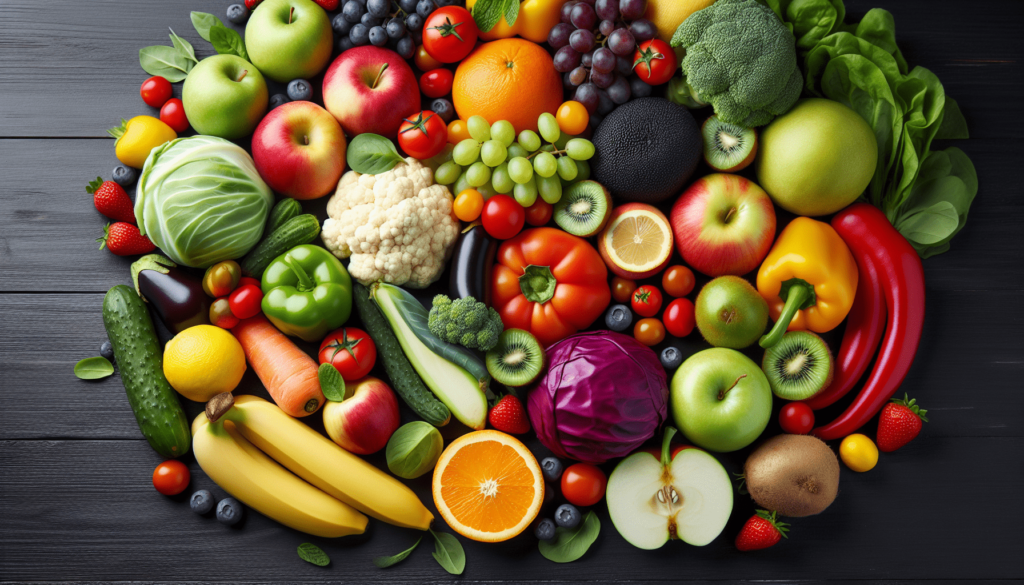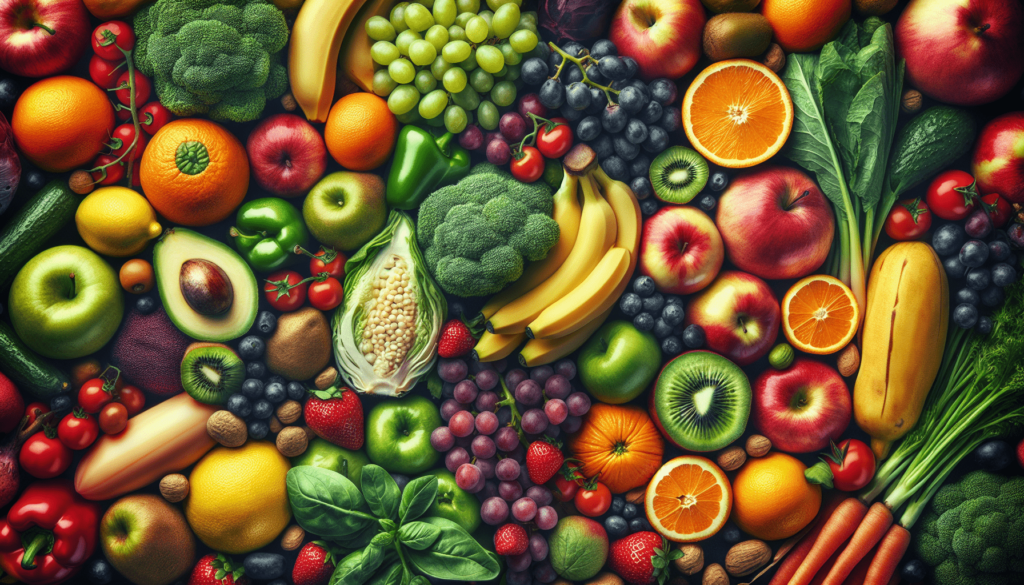Have you ever wondered what impact your diet has on your skin? In this article, we will explore the fascinating relationship between nutrition and skin health. You will learn how the foods you eat can affect the appearance and overall health of your skin. Let’s dive into the science behind the connection and discover how you can improve your skin from the inside out.

Understanding the Basics of Skin Health
Your skin is the largest organ in your body and plays a crucial role in protecting you from external threats. It serves as a barrier against harmful pathogens, regulates body temperature, and helps in the elimination of toxins. Maintaining healthy skin is essential for overall well-being and can have a significant impact on your self-confidence.
Your skin is made up of several layers, each with its unique function. The outermost layer, known as the epidermis, acts as a protective shield and is responsible for skin tone and texture. The dermis, located beneath the epidermis, contains hair follicles, sweat glands, and blood vessels. The innermost layer, the subcutis, is made up of fat and connective tissue, providing insulation and cushioning for your body.
The Role of Nutrition in Skin Health
The food you eat plays a vital role in the health and appearance of your skin. Your skin requires essential nutrients like vitamins, minerals, antioxidants, and fatty acids to function optimally. Without proper nourishment, your skin may become dry, dull, and prone to inflammation and premature aging.
Including a variety of nutrient-dense foods in your diet can help support healthy skin. Fruits and vegetables are rich in vitamins A, C, and E, which have antioxidant properties that protect your skin from damage caused by free radicals. Omega-3 fatty acids found in fatty fish, flaxseeds, and walnuts help maintain skin hydration and reduce inflammation.
Understanding the Impact of Poor Nutrition
On the other hand, a diet high in processed foods, sugar, and unhealthy fats can have a detrimental effect on your skin. These foods can promote inflammation, increase oil production, and lead to acne breakouts. Consuming sugary foods and beverages can also accelerate the aging process by causing glycation, a process that damages collagen and elastin fibers in your skin.
Poor nutrition can worsen existing skin conditions like eczema, psoriasis, and rosacea. Inadequate intake of essential nutrients can weaken your skin’s natural defenses, making it more susceptible to infections and environmental damage. It is essential to be mindful of your eating habits and make informed choices to maintain healthy skin.
Key Nutrients for Healthy Skin
Certain nutrients are particularly beneficial for skin health due to their roles in collagen production, skin repair, and protection against UV damage. Including these nutrients in your diet can help you achieve glowing, youthful skin. Let’s explore some key nutrients and their sources:
Vitamin C
Vitamin C is an essential nutrient for collagen synthesis, a protein that provides structure and elasticity to your skin. It also has antioxidant properties that protect your skin from sun damage and environmental pollutants. Citrus fruits, bell peppers, strawberries, and broccoli are excellent sources of vitamin C.
Vitamin E
Vitamin E is another powerful antioxidant that helps protect your skin from oxidative stress and premature aging. It also supports skin repair and regeneration, promoting smooth and healthy skin. Nuts, seeds, avocado, and spinach are rich sources of vitamin E.
Vitamin A
Vitamin A plays a crucial role in skin cell turnover, the process by which old skin cells are shed and replaced by new ones. It helps prevent clogged pores, acne breakouts, and uneven skin tone. Sweet potatoes, carrots, leafy greens, and liver are good sources of vitamin A.
Omega-3 Fatty Acids
Omega-3 fatty acids are essential fats that support skin hydration, reduce inflammation, and promote a healthy skin barrier. Fatty fish like salmon, mackerel, and sardines, as well as chia seeds and walnuts, are rich sources of omega-3 fatty acids.
Zinc
Zinc is a mineral that plays a crucial role in wound healing, immune function, and oil control in the skin. It helps reduce inflammation and supports collagen production, promoting clear and healthy skin. Oysters, beef, pumpkin seeds, and chickpeas are good sources of zinc.
Selenium
Selenium is an essential mineral that works alongside antioxidants to protect your skin from UV damage and oxidative stress. It helps prevent skin cancer, sunburn, and premature aging. Brazil nuts, sunflower seeds, whole grains, and seafood are excellent sources of selenium.
Including a variety of these nutrients in your diet can significantly improve your skin health and appearance. Consuming a well-rounded diet rich in fruits, vegetables, whole grains, lean proteins, and healthy fats is key to maintaining vibrant and youthful skin.

Water and Hydration
In addition to eating nutrient-rich foods, staying hydrated is essential for maintaining healthy skin. Drinking an adequate amount of water helps flush out toxins, regulate body temperature, and keep your skin hydrated from within. Dehydration can lead to dryness, flakiness, and an increased risk of skin disorders.
The recommended daily water intake varies depending on factors like age, gender, activity level, and climate. On average, you should aim to drink at least 8-10 glasses of water per day to stay properly hydrated. You can also consume water-rich foods like cucumber, watermelon, and celery to increase your overall hydration.
Herbal Teas and Infusions
Herbal teas and infusions are another excellent way to stay hydrated and support skin health. Green tea, in particular, is rich in antioxidants like catechins that protect your skin from UV damage and reduce inflammation. Chamomile tea, hibiscus tea, and peppermint tea are also beneficial for soothing and calming your skin.
The Impact of Sugar and Processed Foods
Consuming high amounts of sugar and processed foods can have a negative impact on your skin. These foods can lead to inflammation, acne breakouts, and premature aging. Excess sugar consumption can also lead to a process known as glycation, where sugar molecules attach to collagen and elastin fibers, causing them to become stiff and less elastic.
Reducing your intake of sugary snacks, desserts, and drinks can help improve your skin’s appearance and overall health. Opt for whole foods like fruits, vegetables, whole grains, lean proteins, and healthy fats instead. Your skin will thank you for making healthier choices that support its natural functions.
Tips for Healthy and Glowing Skin
Achieving healthy and glowing skin is possible with a balanced diet, proper hydration, and a few skincare tips. Here are some additional suggestions to help you maintain radiant and youthful skin:
Protect Your Skin from the Sun
Excessive sun exposure can lead to premature aging, sunburn, and an increased risk of skin cancer. Wear sunscreen with a high SPF, seek shade during peak hours, and wear protective clothing like hats and sunglasses to shield your skin from harmful UV rays. Remember to reapply sunscreen every two hours, especially if you are swimming or sweating.
Practice Good Skincare Habits
Establishing a daily skincare routine can help keep your skin clean, moisturized, and free from impurities. Use a gentle cleanser to remove dirt and makeup, followed by a moisturizer to hydrate and nourish your skin. Exfoliate regularly to remove dead skin cells and stimulate cell turnover for a radiant complexion.
Get Sufficient Sleep
Quality sleep is essential for skin repair and regeneration. Aim for 7-9 hours of sleep per night to allow your skin to recover from daily stressors and environmental damage. Lack of sleep can lead to dark circles, puffiness, and a dull complexion. Make sleep a priority for vibrant and youthful skin.
Manage Stress Levels
Chronic stress can trigger inflammation, hormonal imbalances, and skin issues like acne and eczema. Practice stress-reducing activities like yoga, meditation, deep breathing, or mindfulness to calm your mind and body. Taking time for self-care and relaxation can help improve your skin’s overall health and appearance.
Seek Professional Advice
If you have persistent skin concerns like acne, eczema, or premature aging, consult a dermatologist or skincare professional for personalized advice and treatment options. They can recommend skincare products, treatments, or lifestyle changes tailored to your specific needs and skin type. Don’t hesitate to seek professional help to address any skin issues effectively.
By following these tips and incorporating healthy habits into your daily routine, you can achieve radiant, youthful skin that glows from within. Remember that your skin reflects what you eat, how you care for it, and how you treat your body. Take care of your skin, nourish it from the inside out, and embrace your natural beauty with confidence.
In conclusion, the link between nutrition and skin health is undeniable. Your diet plays a significant role in the appearance, texture, and overall health of your skin. By choosing nutrient-dense foods, staying hydrated, and practicing good skincare habits, you can support your skin’s natural functions and achieve glowing, youthful skin. Make informed choices about what you eat and how you care for your skin to unlock its full potential and radiance. Your skin is a reflection of your inner health and well-being, so treat it with care, respect, and kindness. Your skin deserves the best, so give it the nourishment and attention it needs to thrive.

